I am primarily an autodidact, someone who is self-taught. I have some formal training, primarily in history and economics, but in most everything else my work is entirely the result of my own constant study since nearly the time I began to read. The virtue of an autodidact is that he often comes up with marvelously original and innovative ways to solve problems that are completely outside of the box of formal establishment thinking. The vices of an autodidact are, first, that he tends to have gaps in his knowledge of a subject because of the haphazard way he acquires learning and second (and far worse), that he often tends to have contempt for those who have disciplined formal training.
The first vice can be ameliorated by either establishing some formal pattern to a subject he wants to focus on or consulting regularly with people who have substantial formal training in that subject. The second vice is utterly foolish, a product of both vanity and insecurity that prevents him from covering the gaps in his knowledge.
A big vice among both autodidacts and formally trained intellectuals is the conceit that their brilliant expertise in one field automatically confers expertise in all fields to them. You get no expertise without the work.
Second-rate minds start with a conclusion based on their emotions or some very limited experience and can build a convincing case by cherry-picking data that seems to support the conclusion they started with while ignoring, or not even noticing, data that contradicts that conclusion. While their work can be very detailed, it is more likely to be wrong than it is to be right. If they are dishonest as well as second-rate they will include quotes from notable figures to confirm their own premise when the notable figures’ actual conclusions contradict them.
Third-rate minds are just a throbbing grievance looking for any crackpot nostrum to relieve the desperate dysfunction surrounding them. Surprisingly, some can write pretty detailed screeds. Unfortunately for them anyone with even an ounce of sense can discern the fevered heat radiating from those screeds. If they use source documents at all they make specious interpretations that are overly broad or overly narrow to fit their obsession. If they can’t get any supportive material, they just make it up – including made-up citations.
Ordinary consumers of information and news need not be at the mercy of whoever they are reading, nor do they need to become professional researchers themselves, nor even do they need to rob their families and vocations of significant time to discern what is credible and what is not. It does take some work and mental discipline, though. Following are four techniques you can use to effectively discern the credibility of any source. They don’t require any special or technical expertise, just basic logic and common sense. While they won’t filter out all nonsense, they will clear your head of a good 90 percent of it. But they must be rigorously applied every time. If you skip over them because you are reading something you want to believe you are simply deceiving yourself. Here, then, these basic techniques:
- Truth will stand the test of examination: One of America’s foremost founding principles was that the only proper or safe way to counter errant speech was to fight it with better and more persuasive speech – and then pay attention to the results. Anyone trying to control speech through coercion rather than persuasion is a liar. They may, like the blind hog, come up with an acorn of truth from time to time, but they are unreliable liars. The whole nonsense of “misinformation” and “disinformation” needing to be controlled is an effort, like modern tyrants and kings of old, to control what you may think. Certainly, the establishment media and the government have NO business complaining of misinformation, as they have been the primary purveyors of it. If someone tries to shut down what you can speak of, I dismiss them before I even examine their position – because they are fundamentally power-mad liars.
- Track record: Nobody is right 100 percent of the time. Frankly, if you are on target more than 80 percent of the time you are hall of fame material. But everyone, both prince and pauper, develops a track record. Those who are usually right – and are quick and candid to let you know when they have erred – are the most reliable. Those who try to hide or memory-hole their errors are despicable, intellectual con men. Those who frequently get it wrong may have insights, but are unreliable and their work must be checked. By this metric, climate change activists are the worst “experts” ever, for not a single one of their dire pronouncements has ever come to pass. They should be laughing stocks taken seriously by no one – and any institutions that granted them credentials should be examined for how they can so easily give out such certifications to people who obviously lack any expertise. The establishment media should also be a laughing stock by now, considered reliable by no one, for they have fallen for – and often intentionally peddled – lie after lie, reporting them as certain fact and established science. But they jump from hoax to hoax like Indiana Jones as the ground crumbles beneath them, never taking the time to assess why they get it so wrong so often while accusing those who disagree with them of misinformation. If you rely on people or institutions who are demonstrably wrong most of the time, you discredit yourself.
- Credentials: Contrary to what modern popinjays think, a credential does NOT mean you do not need to justify your assertions: it means you should be able to easily and competently justify those assertions in an area of your credentialed expertise. If someone says they have a Ph.D. in a subject and will brook no questions, ignore them for they are a liar and likely incompetent. On several occasions I have had someone, in discussion, tell me they are an authority on a subject. Every time, I tell them that is all the more reason they should know the material and be able to justify their point. If they do not, they are simply a fraud – and usually an arrogant, incompetent fraud, at that.
- Never reveal all you know: Incompetent goofs love to pretend to more knowledge than they have. You can easily discern them by not being foolish enough to try to impress them with your own knowledge. Ask all who might have genuine expertise honest and serious questions, sprinkling your questions with some you already know the answers to. If their answers to the questions you know are on target, it lends credibility to their assertions that you do not know the answers to. If they just make it up as they go along to try to impress, dismiss them, even if they have some genuine expertise. Rely on them and sooner or later they will lead you off a cliff.
Follow these four rules to determine who you should not pay attention to. Those who well surmount these criteria may still not be right, but truth matters to them. Discussion with them and consideration of their insights will help you find your way.
History is replete with brilliant autodidacts. Among them are Abraham Lincoln, Elon Musk, Blaise Pascal, Frank Lloyd Wright, Gustave Eiffel, Noel Coward, Mark Twain, Leonardo DaVinci, Thomas Edison…the list goes on and on in every field. Those who made a lasting impact had a healthy respect for those who went through the disciplined process to gain credentialed expertise – after ascertaining that the credential represented solid knowledge. You might think that autodidacts and credentialed intellectuals make strange bedfellows. You would be, at least in part, right. However, even this is a useful filter. For those sincere in the search for truth, the credentialed enjoys the autodidact’s originality and the autodidact enjoys the credentialed’s structured foundation. The only ones who get bent out of shape are those in either camp who are insecure or filled with resentment that his counterpart didn’t get knowledge the same way he did.
Do not be fooled by an expert in one field pretending to expertise he does not have in another. Remember, authentic expertise will stand the test of examination, not demand that everyone bow before a credential. No matter how brilliant someone is, he cannot attain expertise without doing the hard, deep work to gain it. God save us from modern “Google intellectuals,” people who think by reading title pages they become experts. They have no context or depth. They are like a man who has a French-English dictionary and pretends to be a fluent speaker of French. He can only peddle the fraud to people who are not native speakers – and not even to most of them.
I certainly have the autodidact’s cockiness that I can develop real expertise in almost any subject. When I was doing radio, it always tickled me when academic guest experts (primarily in economics, history and literature) would ask me off the air where I taught – and their surprise when I told them I didn’t. One of my most delicious moments was when a prominent microbiologist who I asked to vet a paper for me asked me where I taught. She thought I must be lying when I told her I had no background in microbiology, whatsoever, that I just had to get up to snuff to write that vitally important paper competently. But I have a healthy respect for the depth of work involved in gaining real expertise in any subject, so while it is possible to gain the knowledge in any field, it is not expedient. If I have enough basic knowledge to judge the expertise of those who know things I do not (using the four criteria I noted above, among others), then I can gather experts we can trust while focusing on my own areas of interest. The division of labor is crucial to solid, efficient performance in an organization.
Do not be intimidated by people with more attitude than knowledge attacking you. It is borne by their own insecurities and neurotic obsession with being seen as superior. I recently had a silly man inform me that I did not know anything about geo-politics like he did. I knew the man, someone who has endless opinions and little knowledge. I did not bother to remind him that high-ranking officials sometimes ask me for my take on the subject. What you devote yourself to, you can know if you constantly challenge your own assumptions. Don’t let the dogs that bark at you on your way distract you.
If you are an intellectual, do NOT pretend to expertise in a field you don’t have. It does not make people think you are smarter; it dilutes or destroys their confidence in the areas where you actually do have expertise.
At CORAC we have the benefit of a multitude of people who have deep, actual expertise in a multitude of fields. When you get on the website, looking under the material that each of the teams provide, you get the benefit of that genuine expertise. Mutual respect and proper discernment, using the techniques I offered, will give you the confidence to know that you don’t need to be an agricultural expert to avoid buying a pig in a poke. And you don’t need to be a biologist to know what a woman is.
*********
The New York Times (NYT), which just a couple of years ago ridiculed Sweden for its relatively hands-off approach to Covid, has grudgingly conceded that maybe there was merit in that country’s approach. Oh, the NYT is not acknowledging that Sweden has been a spectacular success, preserving its economy and schools intact while getting one of the lowest death rates in the world. As I noted above, phonies never acknowledge when they are flat-out wrong. But truth is a rock – and ideological narratives are just mud sculpted and dried over the rock. Time and reality eventually wash away the illusion the mud provides, revealing the authentic shape of the rock of truth. Phonies are just too vain and stupid to acknowledge it. As the philosopher said, none are so blind as those who refuse to see.
*********
How many people have you known who, to hide their incompetence, busy themselves with trivial matters so they can say they are working hard even as they ignore the serious and weighty matters that demand attention? That is what the federal government has become, the prissy, bossy little assistant manager at a local McDonald’s franchise; frantically bossing everyone around in the forlorn hope they don’t figure out he hasn’t a clue what he is doing.
Meantime, while transgenders try to eradicate women and mutilate children, the toxic United Nations has issued a formal recommendation that sex between adults and children be decriminalized and “affirmed.” Forty years ago, the UN was just useless. Now it is a clear and present danger to our children. Will even the trendy wine-women of the left coast buy into this? I suppose they might: many are eager to mutilate their own children to demonstrate how with-it they are. How long, O Lord, how long?
*********
The gun control crowd got a major setback last week when federal judge Steven McGlynn issued an injunction against Illinois’ law banning a multitude of weapons and accessories. (Disclosure: McGlynn is a longtime friend of mine). I have not read as many full rulings as most lawyers, but I have read a lot more than most laymen. Only 27 pages, this was the clearest, most comprehensive yet concise ruling I have ever read. With no fluff it builds, brick by brick, to its conclusion. It even touched on the serious question of what is causing the deep social dysfunction of mass shootings. Both Reason Magazine and noted legal expert and Constitutional scholar Johnathan Turley seem to share my admiration.
While the decision was issued last Friday, I waited a few days to call my friend, fearful that perhaps our relationship was skewing my opinion of just how good this ruling is. But in most rulings, columnists summarize what it means for their readers with few quotes from the ruling, itself. Columnists on this one quoted big chunks of the ruling itself, confirming my judgment that this was a masterpiece of both clarity and logic. Judicial rulings are usually turgid gobbledygook that you have to wade through to get a few nuggets of insight. Maybe it is because I have such high regard for him personally, but I think the clarity and accessible logic, encompassing the broader issues at stake, of this ruling puts McGlynn squarely among the pre-eminent legal minds of our time. You can link to the full ruling at the bottom of the Turley piece.
Meantime, Amy Swearer of the Heritage Foundation, did a brutal takedown of the gun control crowd’s predicates on Twitter.
I really cannot fathom why the left is determined to ignore crime, mental illness, and border security while demanding that we disarm victims. It seems a very dumb way to reduce crime. It is vital, though, that we not confine ourselves to combatting the assaults of the know-nothing left. This is a deep social problem and we need to get to the root causes and solve them, however much it irritates leftist power-grabbers. Real lives and social cohesion demand it.
*********
Just a reminder that we are in the midst of a fundraising appeal for CORAC. In this month of Mary, I thank you in advance for your generous support and kindness as we work to rebuild the social fabric in anticipation of Our Lord’s great renewal of the faith and the face of the world.

If communication goes out for any length of time, meet outside your local Church at 9 a.m. on Saturday mornings. Tell friends at Church now in case you can’t then. CORAC teams will be out looking for people to gather in and work with.
Find me on Twitter at @JohnstonPilgrim





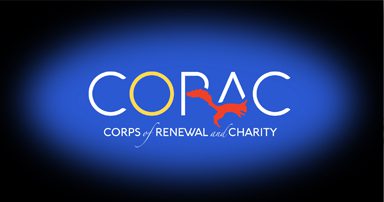

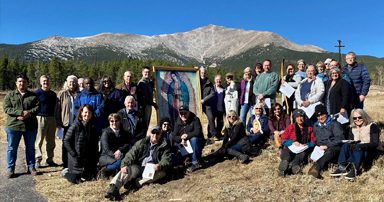
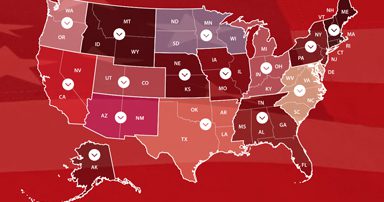



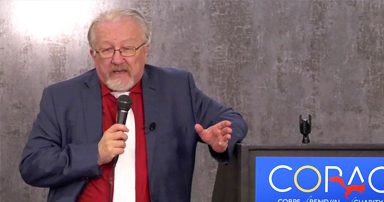
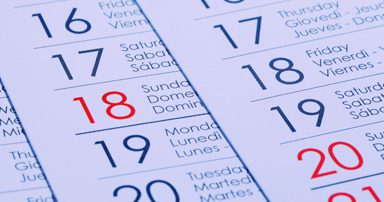






0 Comments